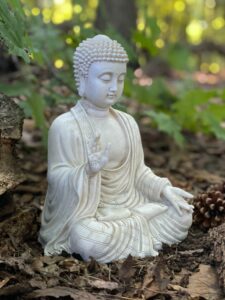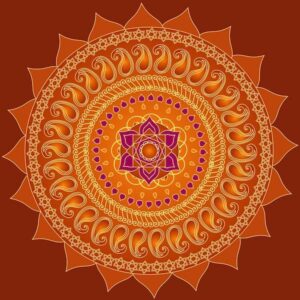Just as a bird needs two wings to fly, so too does a meditation practice in the Buddhist tradition require both wisdom and compassion in order to take flight. Having one without the other doesn’t quite grasp the fullness of what practice is all about and one’s meditative training cannot truly soar without equal cultivation of both. On the one hand, wisdom allows us to experience honestly our hearts and minds, and ultimately the nature of reality. On the other, compassion acknowledges our deepest connection to everyone and everything, cultivating an open heart to the suffering of all sentient beings. Combined, wisdom and compassion create a perfect balance between stillness and movement, emptiness and fullness, and inward seeking and outward giving. Through continuous effort, discipline, and great patience we can all find this balance in our practice.
In the Buddhist tradition, wisdom is our ability to see clearly, or rather see things as they truly are. Clear seeing involves understanding the true nature of all things in the universe, including our sense of self (what we call “ego”). The Buddha found all phenomena (including us!) have three characteristics: Anicca, dukkha, and anatta. Anicca translates to impermanence. Put simply, all things that arise must cease. Everything from a vast galaxy to a single-cell organism is subject to life’s transience. Dukkha – commonly translated as suffering or unsatisfactoriness – arises when we fall for the illusion of permanence, ignorantly grasping on to people, feelings, thoughts, situations, and identities, desperately hoping and believing they somehow will never change. Lastly, since all things are in a constant state of ebb and flow, nothing truly exists as solidly and independently as they seem to. This insubstantiality of all phenomena is the trait of existence called anatta, or no-self. It is not to be understood as the opposite of selfishness (i.e. her selfless nature…), but rather this truth explains how we are not solid, separate beings alone in a cold, empty universe, but rather are the intimate interconnected dance of life itself. As American astronomer Carl Sagan once said, “We long to return, and we can, because the cosmos is also within us. We’re made of star stuff. We are a way for the cosmos to know itself.”
The wisdom of anatta, or our interconnected nature, awakens us to the truth that our happiness is not dependent upon fulfilling every desire that pops up in our minds, but instead depends on bringing happiness and relieving the suffering of others. Realizing no-self is like a wave finally remembering that it’s the entire ocean! With this realization, it sees clearly that each independent wave is not a separate entity, but rather a temporary rising and ceasing of the same salty water that makes up the whole of the vast sea. When we realize we are not separate from everything else, we experience the suffering of others as if it were our own. When this happens, the natural response is the wish to alleviate suffering in any way we can, even if it’s a simple smile or non-judgmental, compassionate presence.
With our continued practice of meditation and mindfulness in daily life, we also see that dukkha does in fact permeate each and every one of our lives. We begin to realize how personally we take the ordinary traumas of existence. In seeing our emotional attachments (the ways in which we stress ourselves out by wishing that things would go “our way”), we begin releasing them, leaving more room for true peace and joy to arise. As we begin peeling away layers of ego, we share with others the ways to freedom that we ourselves are practicing, and our practice goes on.
Look at your own practice, and see if you have an equal balance between both wisdom and compassion. Be honest with yourself and make the necessary changes if you find yourself too focused on one or the other. Remember, just as a bird needs two wings to fly, you too must have wisdom and compassion for your spiritual practice to be complete.
I wish you well on your journey!












